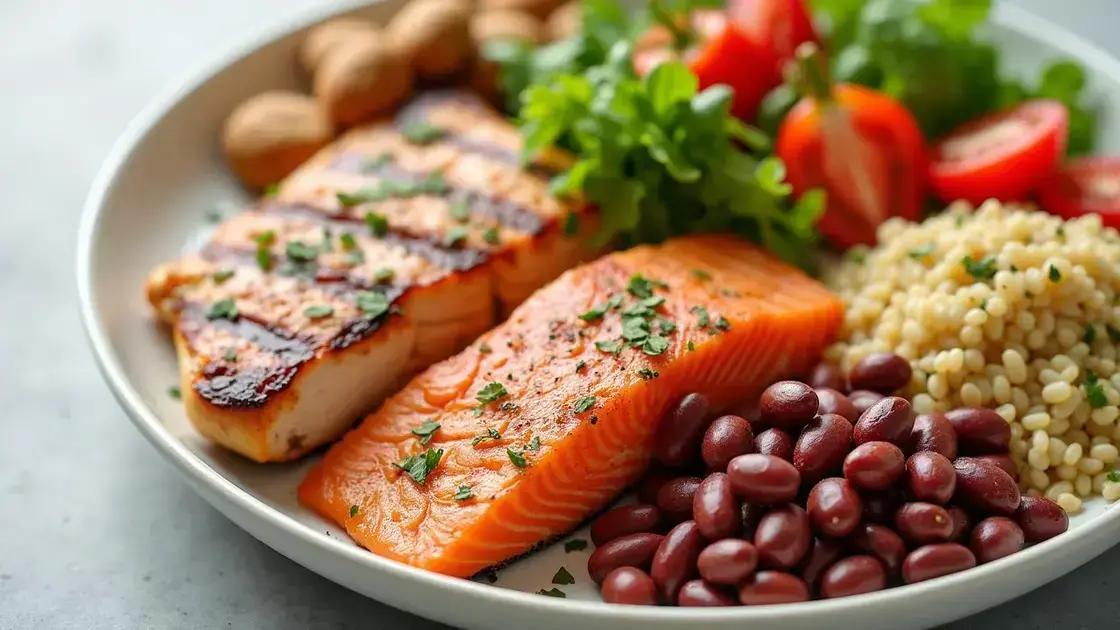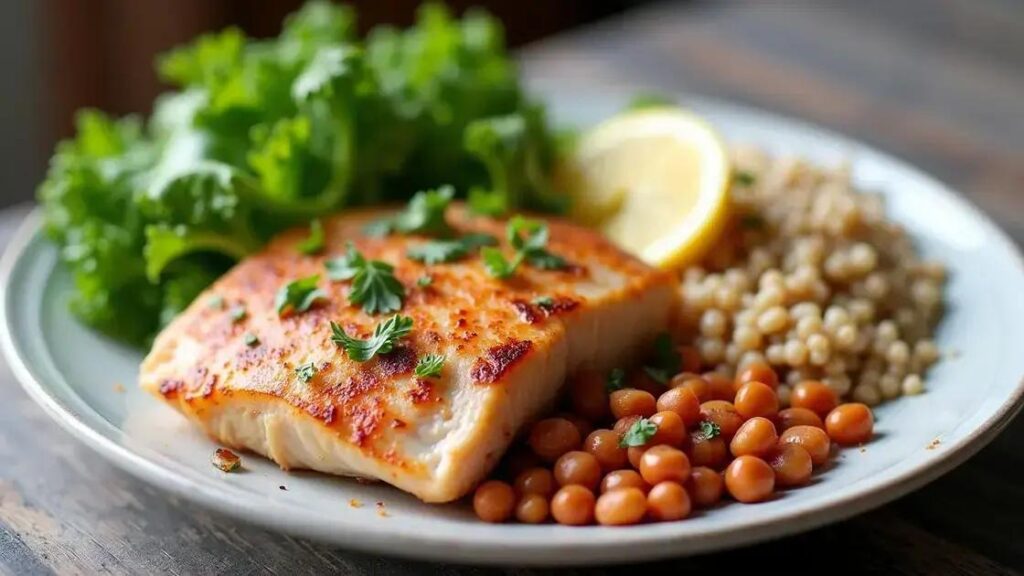Lean protein is crucial for maintaining muscle mass as it aids in muscle repair and growth. Excellent sources include skinless poultry, fish, beans, and low-fat dairy. Incorporating lean protein into your diet can be achieved by planning meals around protein sources, snacking smart, and ensuring you include it at breakfast. Aim for adequate protein intake to support your fitness and health goals.
Lean protein is vital for those looking to maintain muscle mass. Whether you’re an athlete or just someone who values fitness, incorporating lean protein into your diet can lead to remarkable health benefits. Not only does it support muscle repair after workouts, but it also helps in weight management, making it a crucial part of any diet plan. In this article, we’ll break down the importance of lean protein, explore its benefits for muscle mass, identify great sources, and provide tips on how to effectively include it in your meals.
What is Lean Protein?

Lean protein is a term used to describe protein sources that are low in total fat. These protein sources provide essential nutrients needed for maintaining muscle mass while minimizing excess fat intake. Foods that are classified as lean protein typically contain less than 10 grams of fat per serving.
Understanding Lean Protein
Muscle mass maintenance is important for everyone, especially for those engaged in regular exercise or physical activity. This is where lean protein plays a key role. Lean protein forms the building blocks of muscles, helping in repair and growth. While red meats and full-fat dairy products often come to mind when thinking of protein, they may not always be the healthiest options.
Characteristics of Lean Protein
For protein to be considered lean, it should contain vital nutrients without excess calories from fats. Common sources include chicken breast, turkey, fish, beans, and legumes. Incorporating these foods into your diet can promote strength and support muscle health. The American Heart Association recommends choosing lean pork, skinless poultry, or fish as better options for protein intake.
Benefits Beyond Muscle Growth
In addition to supporting muscle mass, lean protein can help with weight management and satiety. It keeps you feeling full longer, which can be important for those watching their weight. These qualities make lean protein a smart choice for anyone looking to improve their overall health and wellness as well as enhance their physical fitness.
Benefits of Lean Protein for Muscle Mass

Consuming lean protein has several key benefits that contribute significantly to maintaining muscle mass. One of the primary advantages is improved muscle repair. After engaging in physical activities or rigorous workouts, your muscles need nutrients to recover. Lean protein provides amino acids essential for muscle repair and growth. This helps reduce muscle soreness and promotes quicker recovery times.
Supports Muscle Growth
Incorporating lean protein into your diet is crucial for those looking to build muscle. Protein synthesis, the process through which the body builds new proteins, requires adequate protein intake. Eating lean sources of protein, like chicken, fish, and legumes, not only fuels this process but also prevents muscle breakdown during weight loss or calorie restriction.
Weight Management
Another benefit of lean protein for muscle mass is its role in weight management. High-protein meals can keep you feeling satisfied longer. This means you are less likely to snack on unhealthy options or overeat later. When combined with exercise, a diet rich in lean protein can help maintain or reduce body fat while preserving muscle mass, making it an ideal solution for those seeking to lose weight healthily.
Boosts Metabolism
Lean protein also has a thermogenic effect, meaning it burns more calories during digestion compared to fats and carbohydrates. This increase in calorie expenditure can support overall weight loss efforts. It helps in maintaining a healthy metabolism, ensuring that your body continues to burn calories efficiently even at rest.
Sources of Lean Protein

There are many sources of lean protein you can incorporate into your diet. Understanding where to find these foods is essential for supporting muscle mass while maintaining a balanced diet.
Animal-Based Sources
Some of the best sources of lean protein come from the animal kingdom. Skinless poultry, such as chicken and turkey, are excellent choices. They are low in fat and rich in protein, making them perfect for muscle maintenance. Fish, particularly varieties like salmon, cod, and tuna, are also high in protein while providing heart-healthy omega-3 fatty acids. Lean cuts of beef, such as sirloin or tenderloin, offer another great option without excessive fat.
Dairy Products
There are various dairy products that contain lean protein. Low-fat yogurt, cottage cheese, and skim milk are good examples. These options are not only nutritious but also rich in calcium, which is essential for bone health. Incorporating these dairy products into your meals can greatly enhance your protein intake.
Plant-Based Sources
If you’re looking for non-animal sources, there are plenty of plant-based proteins available. Foods like beans, lentils, chickpeas, and quinoa are excellent for vegetarians and vegans. They contain protein and other essential nutrients that contribute to muscle maintenance. Additionally, tofu and tempeh are versatile and high-protein options that can be included in various dishes.
Protein Supplements
For those who struggle to meet their protein needs through food alone, protein supplements can be beneficial. Options like whey protein, casein, and plant-based protein powders provide convenient ways to boost your protein intake. However, it’s essential to choose high-quality supplements and consult a healthcare professional if needed.
Incorporating Lean Protein into Your Diet

Incorporating lean protein into your diet is easier than you might think. It’s all about being creative with meals and snacks to ensure you’re getting enough protein without excessive fat.
Plan Your Meals
Start by planning your meals around lean protein sources. When preparing lunch or dinner, think about making grilled chicken or turkey as the main dish. For vegetarian meals, include beans, lentils, or tofu. Planning ahead can help you make healthier choices throughout the week.
Snacking Smart
Healthy snacks are also a great way to increase your protein intake. Opt for snacks like Greek yogurt, cottage cheese, or a handful of nuts. These options are not only delicious but can also keep you full and satisfied. Protein bars can be another convenient option when you’re on the go, but check the labels to ensure they contain healthy ingredients.
Mix and Match
Another easy way to incorporate lean protein is by mixing different protein sources in a meal. For example, combine quinoa with black beans for a nutritious side dish or toss grilled chicken into a salad. This not only enhances the flavor but also boosts the protein content.
Use Lean Protein in Breakfast
Don’t forget about breakfast! Start your day with options like egg whites, oatmeal topped with Greek yogurt, or smoothies made with protein powder. These meals will help kickstart your day with energy and keep your muscles fueled.
The Importance of Lean Protein in Maintaining Muscle Mass
Incorporating lean protein into your diet is essential for preserving and building muscle mass. It plays a crucial role in muscle repair, growth, and overall health. Understanding the various sources of lean protein—from animal products to plant-based options—allows you to make healthier dietary choices.
By planning meals around lean protein, snacking smart, and creatively mixing protein sources, you can easily enhance your diet. Remember that breakfast is an excellent opportunity to start your day with high-quality protein. With these strategies, maintaining muscle mass, managing weight, and promoting overall wellness become attainable goals.
Embrace the potential of lean protein to transform your dietary habits and support your fitness journey effectively.
FAQ – Frequently Asked Questions about Lean Protein and Muscle Mass
What is lean protein?
Lean protein refers to protein sources that are low in total fat. These include skinless poultry, fish, beans, and legumes.
Why is lean protein important for maintaining muscle mass?
Lean protein is essential for muscle repair and growth, helping to preserve muscle mass, especially during exercise or weight loss.
What are some sources of lean protein?
Sources of lean protein include chicken breast, turkey, fish, low-fat dairy products, beans, lentils, and plant-based proteins like tofu.
How can I incorporate lean protein into my diet?
Incorporate lean protein by planning meals around protein sources, choosing healthy snacks like yogurt or nuts, and using protein-rich ingredients in breakfast.
Can protein supplements be used for lean protein intake?
Yes, protein supplements like whey protein and plant-based protein powders can be convenient ways to boost your protein intake.
Is it necessary to consume protein after a workout?
Yes, consuming protein after a workout helps with muscle recovery and repair, making it vital for anyone engaged in physical activity.













